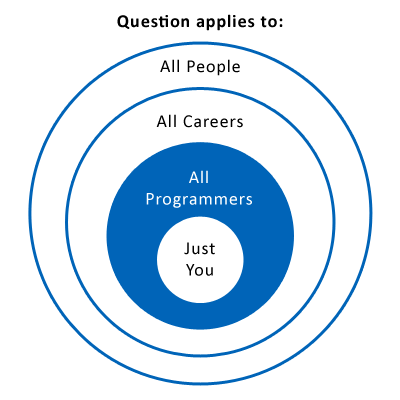Careers questions are a bit of a strange beast. Joel and I always intended them to be on-topic on Stack Overflow, but.. well, keep reading.
Way back in October 2008, Adam Bellaire asked the only poll question I ever found useful. It was eventually deleted in October 2009, but before it was, it got a lot of voting which I do think reflects the popular sentiment on this issue:
Which type of “programming related” questions are appropriate [on Stack Overflow]?
Answers, in order of votes:
Questions intended to resolve a specific programming problem that have multiple possible answers. As with this answer, but the “correct” response is subjective. 85
Questions intended to resolve a specific programming problem that have only one correct answer. A “specific programming problem” can be defined as a problem that exists in code and that can be resolved with correct code (or cannot be resolved at all). These questions are normally language-specific. 84
Questions about best practices and other aspects of programming, including use of software tools used in the development process, standards for maintenance and readability of code, advice to avoid potential coding pitfalls, etc. 74
Questions about software tools that, while not directly related to software development, involve some scripting or programming themselves, for example, Excel or Matlab. 72
Questions about language-agnostic algorithms for hypothetical problems that have potential real-world applications. For example, traveling salesman or BSP. 70
Questions about hypothetical problems that don’t necessarily have real-world applications, for example “code golf” or the “FizzBuzz problem”. 26
Questions about social engineering, management, or career building, ergonomics, or other “soft” topics related to development work. 26
Questions about hardware considerations such as server environments, building an optimal machine, problems with hardware, etc. 12
Polls about what StackOverflow is for (like this one). -24
Questions about programmers’ favorite things (e.g. cartoons, books, movies, pop culture references). -41
Questions about software not directly related to programming, such as Microsoft Word, or usage (not programming!) of device drivers. -57
Now, the actual answers aren't so important here (and ignore the fact that these are kind of specific to programmers), but the general pattern that we're seeing. Notice that the voting goes from 70 directly to 26 and then all the way down to -24. I'd TL;DR it as these three major groups:
strongly on topic: Technical questions.
weakly on topic: Career and hypothetical questions.
off-topic: Hardware, Polls, GTKY, Other.
Interestingly, the community views career questions as only weakly on topic. This definitely supports the split of Stack Overflow and programmers.stackexchange.com in my opinion; these are (sometimes) good questions but the community prefers the hard technical questions over the soft career stuff by a voting margin of 3 to 1.
That said, I don't think it's rational to split into an entire site just to support useful soft career questions, or to outlaw them completely. They are still on-topic, provided they ...
- are truly constructive and not just a call for an infinite list of opinions
- do not overwhelm the site in volume, since the hard technical stuff is why we attract the best users; too many "soft" career questions will turn experts away
- fit into this handy graph (just replace "Programmers" with "Sysadmins"):


